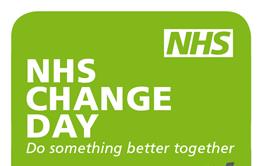The beauty of the NHS Change Day movement is that it is far more than making a promise, it is a statement of intent to make care better for those who need it, says Pollyanna Jones
NHS Change Day 2014 is fast approaching and with its imminent arrival I’m starting to hear, in some quarters, the usual Monty Python-like refrain: “Change Day? What has it ever done for us?”
So comparing the impact of Change Day on the NHS to that of the Romans on Europe is stretching it a bit. But the similarities are there.
As one of the “emerging leaders” helping to drive Change Day, I’m admittedly closer to the movement than most. But because of that I can feel the energy being created as it gathers momentum.
Is it relevant?
I can see the massive potential of people coming together to collectively express their passion for the NHS and their compassion for patients.
For others on the periphery, understanding how and why Change Day is relevant can be difficult. I’d be lying if I said I hadn’t encountered apathy and, on occasion, even animosity towards what it all stands for.
In many ways this is completely understandable. The very nature of Change Day means it relies on people pledging something that they are actually willing and able to do.

‘A seemingly simple gesture could end up being the one thing a patient remembers about their care’
That inevitably leads to what some see as “insignificant” pledges such as smiling for a day or promising to go out of your way to compliment a colleague on their work.
But to believe that these basic pledges on their own represent the heart of Change Day is to be as mistaken as thinking that the Romans only built a few roads.
Day of inspiration
The beauty of Change Day – and the reason why it inspires me and so many others – is that the whole is immeasurably bigger than the sum of the parts.
Each pledge to smile might appear simple, but that seemingly simple gesture could end up being the one thing a patient remembers about their episode of care.
Each pledge – big, small, serious or fun – represents one more person who is prepared to stand up and be counted. It’s a way for people to give a visible commitment to make a positive difference to those around them.
Every pledge – from the GP turning off the electronic sign and engaging with patients in the waiting room, to the paediatric surgical team ensuring a child’s favourite toy is with them when they come round in the recovery room – is a tangible affirmation of the principles that underpin the NHS constitution.
It says: “All staff will be empowered to put forward ways to deliver better and safer services for patients and their families.”
What is NHS Change Day?
- The day aims to inspire and mobilise staff, patients and the public to do something better to improve care.
- Anyone can get involved to pledge something that will make a difference. This could be something that is part of your everyday routine or something extraordinary.
- This year NHS Change Day is on 3 March and pledges can be made until 31 March.
- The inaugural NHS Change Day took place in March last year.
A statement of intent
NHS Change Day unites people around a common goal. Sometimes this manifests itself as a network of individuals with similar interests and at other times it can show up as a groundswell of people supporting a pledge that chimes with the way they feel about a particular subject.
The Change Day pledge is far more than just a promise. It is a statement of intent.
‘There will be pledges that have the potential to revolutionise clinical or managerial practice’
Making a pledge says you understand that our NHS is a collection of people who share a common purpose: to care for those who need our help.
It shows that you appreciate the effect that every single interaction has on the way a patient, carer or family member perceives their NHS care.
This year there will be pledges that have the potential to revolutionise clinical or managerial practice.
Rome wasn’t built in a day
Ongoing projects kicked off by Change Day 2013 already include a pharmaceutical pilot to try and make children’s medicines taste better and a new teaching module that involves trainee nurses actually being bed bound so they can appreciate the patient’s point of view.
‘A major part of Change Day’s strength comes from the fact that it isn’t prescriptive and has no expectations’
There will also be many thousands more – such as smiling or making the effort to address a patient by their first name – which have a benefit that is difficult to measure.
But the fact is that all of these pledges have equal weight. They each add another voice. They each represent someone taking responsibility for themselves and their actions.
Without doubt there will be those in the run-up to 3 March who can’t shake off the “so what” syndrome when they hear colleagues talking about what they’re pledging for Change Day.
But that’s fine. A major part of Change Day’s strength comes from the fact that it isn’t prescriptive and has no expectations. Those who get behind it do so because they want to, not because they feel they ought to. In time, their enthusiasm will become too infectious to ignore.
As the old saying goes, Rome wasn’t built in a day.
Pollyanna Jones is regulatory performance manager for King’s College Hospital Foundation Trust
NHS Change Day: a new social movement

Thousands of NHS staff will pledge to improve patient experience
- 1
- 2
- 3
- 4
- 5
- 6
 Currently
reading
Currently
reading
NHS Change Day: even the smallest pledge makes a difference







































7 Readers' comments